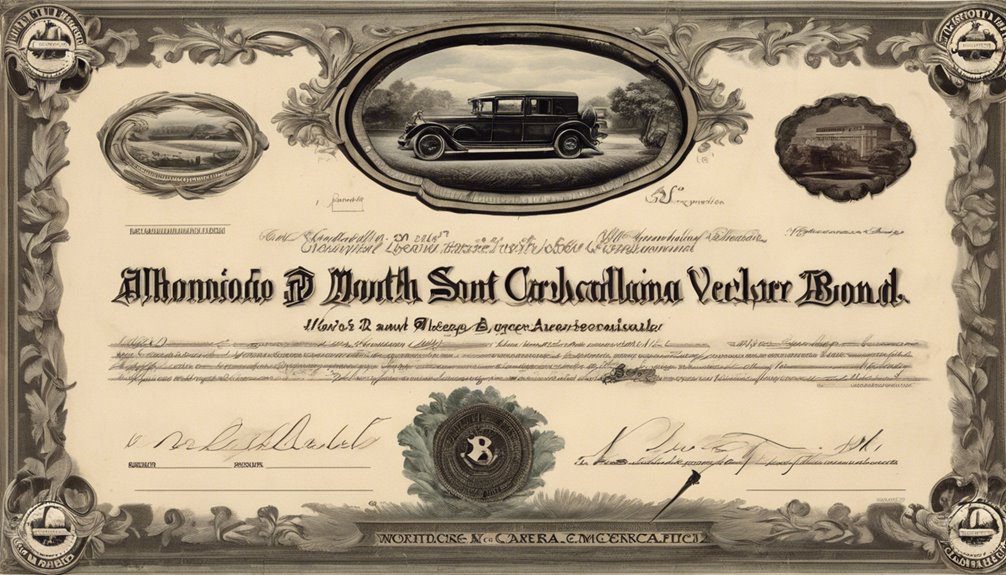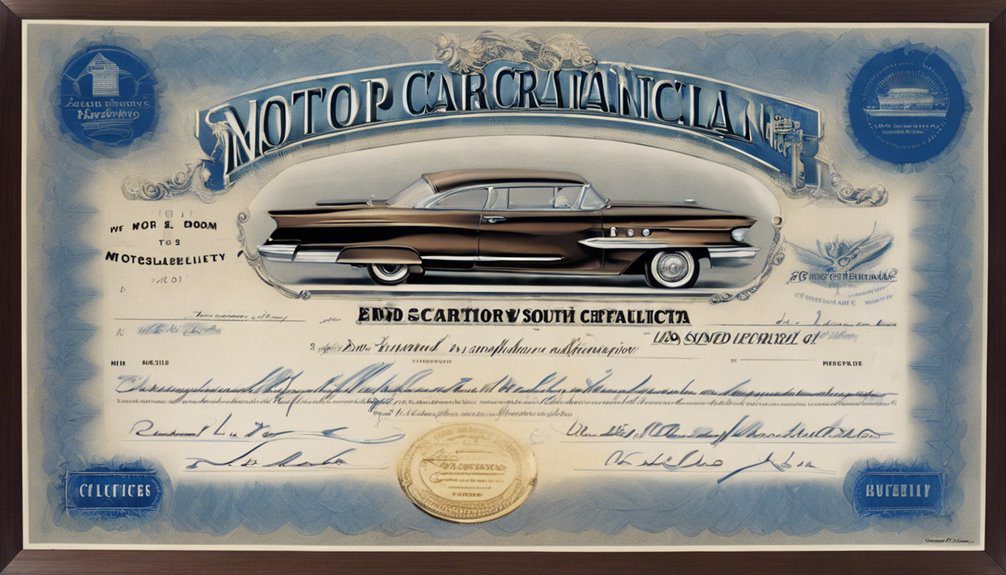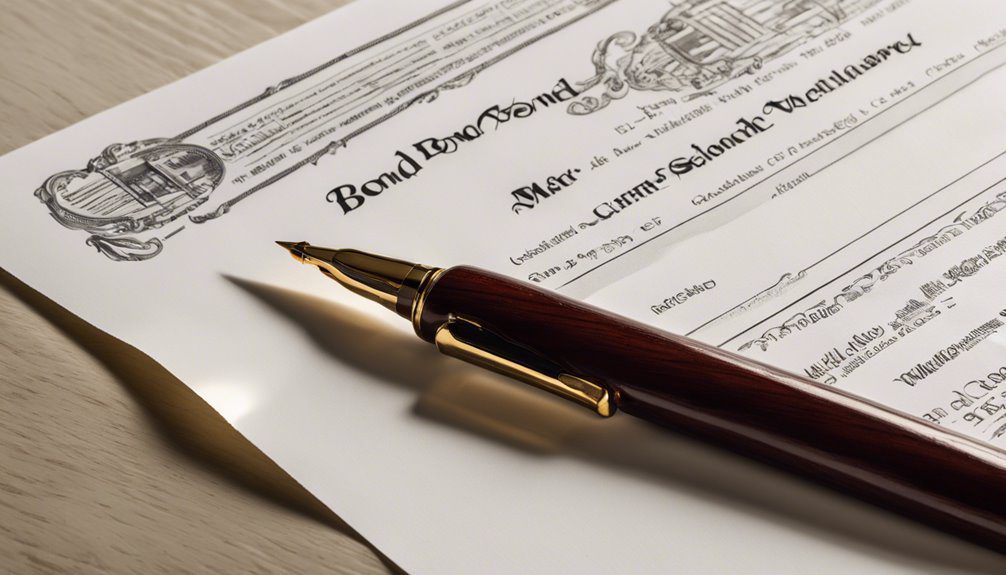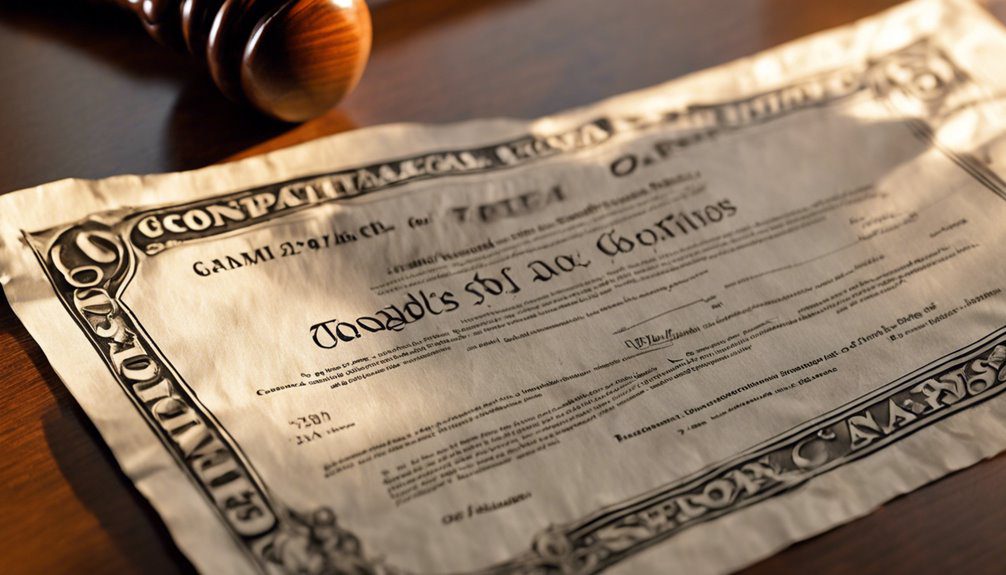If you're a vehicle dealer or wholesaler in South Carolina, you've probably heard about the $30,000 Motor Vehicle and Wholesaler Bond. This bond isn't just a formality; it's a vital part of your business's compliance strategy, ensuring you adhere to state regulations and protect consumers. But what exactly does it entail, and how can it impact your operations? Understanding its requirements and benefits could be the key to your success in the automotive market, and the implications of not having it might surprise you.
Understanding the Bond

Understanding the South Carolina motor vehicle bond is crucial for anyone looking to navigate the state's vehicle registration process. This bond serves as a financial guarantee that you'll comply with state laws regarding vehicle ownership and registration. Essentially, it protects the state and the public from potential financial loss caused by your actions related to motor vehicles.
When you obtain a motor vehicle bond, you're essentially promising to abide by all relevant regulations and laws. If you fail to do so, the bond can be used to cover any claims made against you. This means that you'll have a responsibility to ensure your vehicle is properly registered and complies with all state requirements.
In South Carolina, the bond amount is typically set at $30,000, providing a safety net for the state and others who may be affected by your activities.
It's important to remember that this bond isn't just a formality; it's a critical aspect of maintaining your legal standing as a vehicle owner. Ensuring you understand the bond's purpose and requirements will help you stay compliant and avoid any potential issues down the road. Additionally, compliance with Arkansas transportation regulations is essential for securing similar bonds in other states.
Bond Requirements
When applying for a South Carolina motor vehicle bond, you'll need to meet specific requirements to ensure compliance with state regulations.
First, you must be a licensed motor vehicle dealer or wholesaler in South Carolina. This means you've gone through the necessary licensing process with the South Carolina Department of Motor Vehicles (DMV).
Next, you'll need to obtain a bond amounting to $30,000. This is the standard amount required by the state to protect consumers and maintain business integrity.
You'll also need to provide personal and business information, including your Social Security number and business tax identification number.
Additionally, it's essential to have a good credit history, as many surety companies will evaluate this when issuing your bond. If your credit isn't in the best shape, you might face higher premiums.
Lastly, be ready to pay the bonding fee, which varies based on your creditworthiness and the surety company you choose. Understanding bonding requirements will help you secure your bond and operate your motor vehicle business legally in South Carolina.
Purpose of the Bond

The primary purpose of a South Carolina motor vehicle bond is to protect consumers and ensure that dealers operate with integrity. This bond acts as a financial guarantee that you, as a dealer, will comply with state regulations and conduct your business ethically. If you fail to meet these obligations, the bond provides a safety net for consumers, allowing them to seek compensation for any financial losses incurred due to your actions.
By securing this bond, you show your commitment to fair practices and accountability in the automotive industry. It not only helps build trust with your customers but also enhances your reputation as a reliable dealer.
Moreover, the bond serves as a deterrent against fraudulent activities, reinforcing the importance of honesty in your transactions. In essence, having a South Carolina motor vehicle bond is crucial for safeguarding consumer interests, as it ensures that you adhere to laws and regulations and create a more transparent marketplace.
Ultimately, this bond not only protects consumers but also helps you maintain a positive business environment, fostering long-term relationships with your clients.
Application Process
Typically, applying for a South Carolina motor vehicle bond involves several straightforward steps that ensure you're prepared to meet the state's requirements.
First, gather all necessary documentation, including your business license, sales tax number, and any previous bonding information. This paperwork will be essential during the application process.
Next, you'll want to research bonding companies that are licensed to issue bonds in South Carolina. Reach out to a few providers to compare their terms and services. It's a good idea to ask about their experience with motor vehicle bonds specifically, as this can impact your application's success.
Once you've chosen a bonding company, complete their application form. This usually includes personal and business information, as well as details about your financial history. Be honest and thorough; any discrepancies could delay your application.
After submitting your application, you may need to provide additional information or clarification. The bonding company will assess your application and financial stability before issuing the bond.
Once approved, you'll receive your bond paperwork, which you'll need to file with the state to finalize everything.
Costs and Fees

After you've completed the application process, understanding the costs and fees associated with obtaining a South Carolina motor vehicle bond is important. The bond itself is typically set at $30,000, but you won't pay that full amount upfront. Instead, you'll pay a premium based on your financial history and the bonding company's assessment.
This premium usually ranges between 1% to 10% of the bond amount, which means you might be looking at costs anywhere from $300 to $3,000.
In addition to the premium, there might be other fees involved, such as application fees or service charges, which can vary by provider. It's crucial to read the fine print and ask your bonding agent about any additional costs you might incur during the process.
Keep in mind that your credit score and business experience can influence your premium, so maintaining good credit can help minimize your expenses. Additionally, some bonding companies offer payment plans, which can ease the financial burden. Always compare quotes from different providers to ensure you're getting the best deal for your bond. Furthermore, understanding the bond requirements can help you better prepare for the application process and potential costs.
Compliance and Regulations
While navigating the process of obtaining a South Carolina motor vehicle bond, it's essential to understand the compliance and regulations that govern it. This bond serves as a safeguard for consumers, ensuring that you adhere to state laws when operating as a motor vehicle dealer or wholesaler.
First, you'll need to be licensed with the South Carolina Department of Motor Vehicles (DMV). This includes submitting the required application and meeting specific criteria, such as having a physical dealership location.
You must also maintain accurate records of vehicle transactions and comply with all sales and advertising regulations.
Moreover, you'll have to renew your bond periodically, ensuring it remains active and valid. Additionally, any changes in your business structure or ownership may require you to update your bond.
It's crucial to stay informed about changes in state laws that could affect your obligations, as licensing often contingent on securing appropriate surety bonds is a significant aspect of operating legally in this industry.
Consequences of Non-Compliance

Failing to comply with South Carolina's motor vehicle bond requirements can lead to serious consequences for dealers and wholesalers. If you don't secure the necessary $30,000 bond, you risk losing your dealer license and facing fines.
The South Carolina Department of Motor Vehicles (DMV) takes these regulations seriously, and non-compliance can trigger investigations that may reveal other violations.
Additionally, not having a bond could expose you to financial liability. If a customer files a claim against you for fraud or failure to deliver a vehicle, your assets might be at stake. The bond acts as a safety net, protecting your clients and ensuring you're held accountable for your actions.
You could also face negative impacts on your business reputation. News of non-compliance can spread quickly, driving potential customers away and harming your sales. Furthermore, you might find it challenging to secure financing or partnerships if your business is seen as unreliable.
In short, adhering to bond requirements isn't just a legal obligation; it's crucial for the longevity and success of your dealership. Make sure you stay compliant to avoid these unwanted repercussions. Surety bonds serve as a critical tool in ensuring that businesses meet their obligations and protect all parties involved.
Conclusion
In summary, the South Carolina Motor Vehicle and Wholesaler Bond is essential for your dealership's credibility and compliance with state laws. By securing this $30,000 bond, you not only protect consumers and the state but also enhance your reputation in the automotive market. Staying informed about the requirements and maintaining compliance is crucial to avoid penalties and ensure your business thrives. Don't underestimate the importance of this bond—it's a key step toward building trust and success in your dealership.


